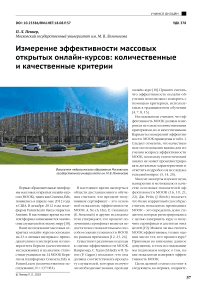Измерение эффективности массовых открытых онлайн-курсов: количественные и качественные критерии
Автор: Пеккер Полина Леонидовна
Журнал: Высшее образование сегодня @hetoday
Рубрика: Педагогика
Статья в выпуске: 8, 2018 года.
Бесплатный доступ
Показано, что проблема эффективности массовых открытых онлайн-курсов (МООК) остается актуальной. Отмечается, что большинство исследователей рассматривают долю получивших сертификат как основной показатель эффективности обучения. По статистике, не все слушатели МООК получают сертификат о прохождении курса, так как многие регистрируются, но так и не приступают к просмотру лекций и выполнению заданий курса. Подавая заявку на участие, слушатели МООК не ставят цель получить сертификат о прохождении курса. Подчеркивается, что пока нет единственно правильных методов измерения эффективности МООК. Приводятся результаты исследования, основанного на 23 личных интервью с преподавателями МООК из Университета Беркли, в ходе которых 85% опрошенных преподавателей высказали мнение, что эффективность МООК может быть измерена количеством слушателей, достигших личных целей. Дается анализ 14 массовых открытых онлайн-курсов Университета Беркли с платформ Coursera, Edx и FutureLearn (N = 137 081). Рассматривается портрет слушателя МООК этих образовательных платформ, составленный на основе данных об их возрасте, поле, образовании и личных целях. Проанализированы мнения преподавателей об областях и уровнях образования, где МООК могут быть наиболее эффективны в будущем.
Массовые открытые онлайн-курсы (моок), эффективность моок, личные цели, количественные и качественные методы
Короткий адрес: https://sciup.org/148321104
IDR: 148321104 | УДК: 378 | DOI: 10.25586/RNU.HET.18.08.P.37
Список литературы Измерение эффективности массовых открытых онлайн-курсов: количественные и качественные критерии
- Allen E., Seaman J. (2015, February) Grade Level: Tracking Online Education in United States. Babson Survey Research Group and Quahog Research Group, LLC. P. 1-66. https://eric.ed.gov/?id=ED572778 (дата обращения: 09.07.2018).
- Armendariz D., Garcia D., Fox A. (2014) OCTAL: The Online Course Tool for Adaptive Learning. Electrical Engineering and Computer Sciences University of California at Berkeley. Technical Report No. UCB/EECS-2014-76: http://www2.eecs.berkeley.edu/Pubs/TechRpts/2014/EECS-2014-76.pdf (дата обращения: 09.07.2018).
- Chuang I., Ho A. (2016, December 23) HarvardX and MITx: Four Years of Open Online Courses -Fall 2012 -Summer 2016 (December 23, 2016). P. 1-19 DOI: 10.2139/ssrn.2889436
- Clark D. (2016, February 27) MOOCs: Course Completion is the wrong Measure of Course Success. Class Centкal: https://www.class-central.com/report/moocs-course-completion-wrong-measure/(дата обращения: 09.07.2018).
- Creswell J. W. (2007). Qualitative inquiry and research design: Choosing among approaches (2nd ed.). Thousand Oaks,CA: Sage.
- Cross S. (2013) Evaluation of OLDS MOOC Curriculum Design Course: participant perspectives, expectations and experiences. OLDS MOOC Project, Milton Keynes. The Open University Publications. Retrieved from http://oro.open.ac.uk/37836/1/EvaluationReport_OLDSMOOC_v1.0.pdf/(дата обращения: 09.07.2018).
- Devlin K. (2013) MOOCs and the Myths of Dropout Rates and Certifi cation. Retrieved from http://www.huffi ngtonpost.com/drkeith-devlin/moocs-and-the-mythsof-dr_b_2785808.html (дата обращения: 09.07.2018).
- Donald C. (2016) MOOCs: Course Completion is the Wrong Measure of Course Success . Retrieved from https://www.class-central.com/report/moocs-course-completion-wrong-measure/(дата обращения: 09.07.2018).
- Emanuel E., Christensen G., Steinmetz A., Alcorn B., Bennett A., Woods D. (2013). Online education: MOOCs taken by educated few.Nature, 503, 346 DOI: 10.1038/503342a
- Hadi S., Gagen P. (2016) M. New model for measuring MOOCs completion rates. European Stakeholder Summit on experiences and best practices in and around MOOCs. 95-105. Retrieved from https://www.researchgate.net/publication/293884848_Proceedings_of_the_European_Stakeholder_Summit_on_experiences_and_best_practices_in_and_around_MOOCs_EMOOCS_2016 (дата обращения: 09.07.2018).
- Hill P. (2013, March 10) Emerging Student Patterns in MOOCs: A (Revised) Graphical View. . Retrieved from https://mfeldstein.com/emerging-student-patterns-in-moocs-a-revised-graphical-view/(дата обращения: 09.07.2018).
- Ho A., Reich J., Nesterko S., Seaton D., Mullaney T., Waldo J., Chuang I. (2014). HarvardX and MITx: The first year of open online courses, Fall 2012-Summer 2013 (HarvardX and MITx Working Paper No. Retrieved from http://papers.ssrn.com/sol3/papers.cfm?abstract_id=2381263 (дата обращения: 09.07.2018).
- Jordan K. (2014). Initial Trends in Enrolment and Completion of Massive Open Online Courses.The International Review of Research in Open and Distance Learning, 15(1), 133-160. Retrieved from http://www.irrodl.org/index.php/irrodl/article/view-File/1651/2813 (дата обращения: 09.07.2018).
- Kizilcec R. F., Perez-Sanagustin M., Maldonado J. J. (2017). Self-Regulated Learning Strategies Predict Learner Behavior and Goal Attainment in Massive Open Online Courses. Computers & Education, 104, 18-33 DOI: 10.1016/j.compedu.2016.10.001
- Kizilcec R. F. & E. (2015). Motivation as a Lens to Understand Online Learners. ACM Transactions on Computer-Human Interaction (TOCHI), 22(2) DOI: 10.1145/2699735
- Koller D., Ng A., Chen Z. (2013) Retention and Intention in MOOC: In Depth. EDUCAUSE Review Online. Retrieved from https://er.educause.edu/articles/2013/6/retention-and-intention-in-massive-open-online-courses (дата обращения: 09.07.2018).
- Kolowich S. (2013) Coursera Takes a Nuanced View of MOOC Dropout Rates. The Chronicle of Higher Education. Retrieved from https://www.chronicle.com/blogs/wiredcampus/coursera-takes-a-nuanced-view-of-mooc-dropout-rates/43341 (дата обращения: 09.07.2018).
- MOOC Platform Comparison Table (2017). Retrieved from https://www.mooclab.club/pages/mooc_platform_comparison/(дата обращения: 09.07.2018).
- Reich J. (2014) MOOC Completion and Retention in the Context of Student Intent. EDUCAUSE Review Online. Retrieved from https://er.educause.edu/articles/2014/12/mooc-completion-and-retention-in-the-context-of-student-intent (дата обращения: 09.07.2018).
- Rizzuto M. (2017) Design Recommendations for Self-Paced Online Faculty Development Courses. TechTrends: Linking Research and Practice to Improve Learning. Vol. 61. № 1. Р. 77-86 DOI: /10.1007/s11528-016-0130-8
- Stracke C. (2017) The Quality of MOOCs: How to Improve the Design of Open Education and Online Course for Learners? Learning and Collaboration Technologies. Novel Learning Ecosystems. Ch. 23 DOI: 10.1007/978-3-319-58509-3_23
- Stracke C. (2015) The Need to Change Education towards Open Learning. International LINQ Conference. 11-24 DOI: 10.13140/RG.2.1.4377.8800
- Suzannah E., Myrick J. G. (2015) How MOOC instructors view the pedagogy and purposes of massive open online courses, Distance Education, 36:3, 295-311 DOI: 10.1080/01587919.2015.1081736
- Zheng S., Rosson M. B., Shih P. C., Carroll J. M. (2015). Understanding Student Motivation, Behaviors and Perceptions in MOOCs. Proceedings of the 18th ACM Conference on Computer Supported Cooperative Work & Social Computing -CSCW ’15. Р. 1882-1895 DOI: 10.1145/2675133.2675217


